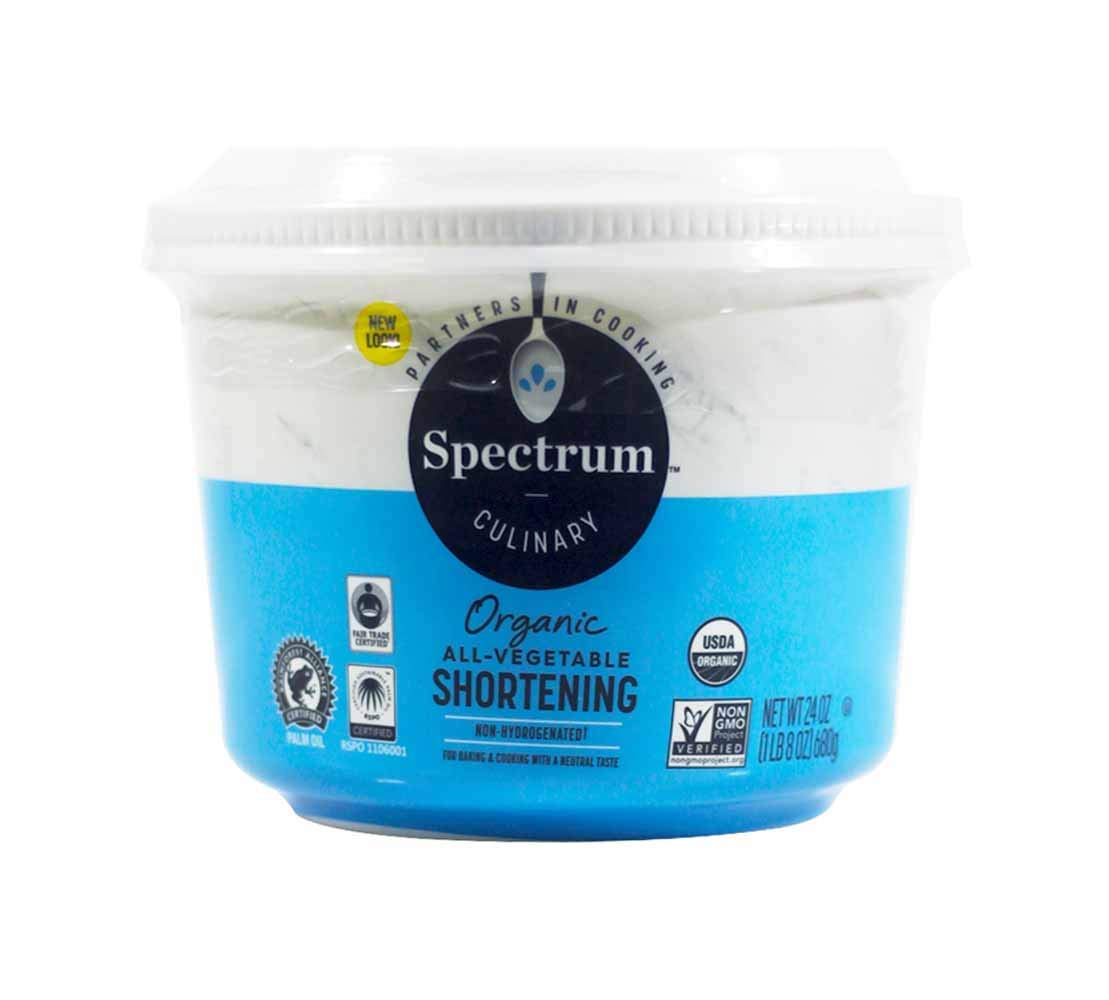Last Updated on April 20, 2022
Today, we’re going to be answering the question: is shortening gluten free? And taking a look at some gluten-free shortening brands and the best ways to use shortening in your cooking and baking. There are times when a recipe will call for shortening, or you’ve run out of butter but have shortening in the pantry – but is it gluten-free? First, let’s take a look at what shortening actually is.
What Is Shortening?
Simply put, shortening is fat that remains solid when at room temperature. It’s used most often in baking and helps to give baked goods a crumbly texture. While butter does fit the criteria as “shortening”, it’s very rarely classified as one.
Ingredients In Shortening
It’s difficult to generalize shortening, as every shortening is different. However, the most common shortening is most definitely Crisco. Crisco All Vegetable Shortening contains the following ingredients:
- soybean oil
- fully hydrogenated palm oil
- palm oil
- mono and diglycerides
- TBHQ
- citric acid (antioxidants)
Read more about: Is Crisco All Vegetable Shortening Gluten-Free?
Is Shortening Dairy Free?
Typically, shortening is not just gluten-free – but dairy-free too. This is what makes shortening such a great substitute for butter or margarine, as it caters to a range of dietary lifestyles. Most shortening is also suitable for vegans as it does not contain any dairy products.
Is Shortening Good For You?
Unfortunately, shortening is not good for you. It’s high in fat and high in calories and has no nutritional value. For this reason, it’s best to limit how much shortening you have in your diet. Some healthier alternatives to shortening are butter, coconut oil, avocado oil, and olive oil (all of which are gluten-free).
What Is Shortening Used For?
You can use shortening for a range of recipes – but its most common use is to make baked goods tender and flaky. For this reason, it’s best when making the following foods:
- cookies
- cakes
- pie crusts
- pastry
What’s The Difference Between Gluten Free and No Gluten?
Often, shortening will not carry a “gluten-free” label. This is because it’s a naturally gluten-free product. However, when a product is labeled gluten-free, this means that it’s been tested for gluten and has met strict guidelines set by the FDA, making it as safe as possible. When a product doesn’t contain gluten but doesn’t carry a “gluten-free” label, it may have come into contact with gluten during manufacturing. However, this is very unlikely when it comes to shortening.
Gluten Free Shortening Brands
The following brands are all gluten-free, and can safely be consumed when living a gluten-free lifestyle. Let’s take a look at our top picks when it comes to shortening.
Crisco
Crisco is without a doubt, the most popular brand when it comes to shortening. Their All-Vegetable Shortening was once considered a potential risk of cross-contact, but they now state that their shortening is “gluten-free” on their website. The following Crisco products are gluten-free:
- All Vegetable Shortening
- All Vegetable Shortening Baking Sticks
- Butter Flavor All Vegetable Shortening
- Butter Flavor All Vegetable Baking Sticks
Crisco is easily accessible in almost all grocery stores, and you can find out more here.
Spectrum
While Crisco is the easiest to find (and the cheapest), it’s definitely not the most healthy. Spectrum Organic All Vegetable Shortening is a healthier alternative that you may like to try. Not only is it gluten-free, but also organic, non-GMO and Fairtrade certified. What’s great about this brand is that it has no hydrogenated fats and 0g trans fat per serving – unlike Crisco.
The singular ingredient in this product is organic palm oil. You can find out more about this product here.
Nutiva
Nutiva is another brand that’s perfect for a gluten-free lifestyle. This is another healthier option for Crisco and is also organic and non-GMO. It’s made using a mixture of coconut and palm oils. The Nutiva Organic Shortening contains the following ingredients:
- palm fruit oil (organic)
- unrefined virgin coconut oil (organic)
- unrefined red palm oil (organic)
It costs around $7.49 for a 15oz tub and you can find out more information here.
Conclusion
I hope this article has helped to answer the question: is shortening gluten-free? And helped you identify the right gluten-free shortening for you. Be sure to limit how much shortening you’re adding to your diet, as it’s not the healthiest food choice. However, it is naturally gluten-free – which is great news for us!
Do you know of any gluten-free shortening brands? Or do you have a gluten-free recipe using shortening that you’d like to share? If so, please feel free to let me know in the comments below. Sharing is caring!
Read more about: Does Baking Powder Have Gluten? (& GF Substitutes)
FAQs
What Does Shortening Do To Gluten?
You may be wondering where shortening gets it's name - and it actually gets it's name from what it does to gluten. Shortening breaks down gluten and stops the dough becoming stretchy, which is why it's perfect for baked goods. It breaks the gluten into shorter (excuse the pun!) strands.
What is Shortening Made of?
Shortening can be made from a range of ingredients - however, it's always made of fat. It just all depends on where the fat has come from. It's most commonly vegetable oils.
What Can I Use Instead of Shortening?
If you want to use something that contains slightly less fat in your baking and cooking, you can simply swap out the shortening for butter or margarine. They all do the same job! It's worth noting that butter and margarine contain water, as opposed to being pure fat like shortening - so this should be taken into consideration when making the substitute.
Is Vegetable Shortening Gluten Free?
Yes. Shortening should always be gluten free - there is no reason that it should contain gluten. I have never come across a shortening that contains gluten, but it's always best to check the ingredients label of anything you purchase, just in case. Shortening is just fat, so there is no reason why it should contain gluten.

Hi, my name’s Zoë. I’m 28 years old and live in London, UK. I work full time as a freelance writer and critic for West End theatre. Writing has been a passion of mine for as long as I can remember. I spend most of my free time at the theatre, or at conventions. I’m married to the love of my life, and live in a small apartment with my fur baby, Lillie. I run two of my own blogs: No Safer Place and Stage to Page: both of which have won awards. I also have a YouTube channel where I talk about all things stagey.



